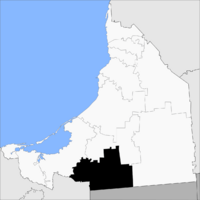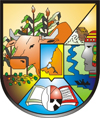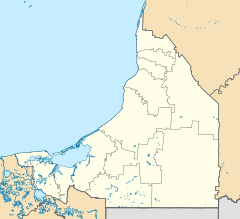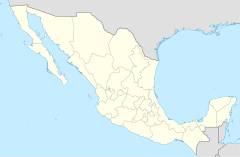Candelaria Municipality facts for kids
Quick facts for kids
Candelaria
|
||
|---|---|---|
|
||

Location of Candelaria
|
||
| Country | ||
| State | Campeche | |
| Municipal seat | Candelaria | |
| Area | ||
| • Total | 5,518.5 km2 (2,130.72 sq mi) | |
| Elevation | 49 m (161 ft) | |
| Population
(2015)
|
||
| • Total | 43,879 | |
| • Density | 7.95120/km2 (20.59351/sq mi) | |
| Time zone | UTC−6 (Central (US Central)) | |
| • Summer (DST) | UTC−5 (Central) | |
| Created | 19 June 1998 | |
| Website | www.candelaria.gob.mx/ | |
Candelaria is one of the 13 municipalities in the Mexican state of Campeche. It is located in the southern part of the state. The main town and largest settlement is also called Candelaria. In 2010, about 41,194 people lived there. The name "Candelaria" comes from the Candelaria River, which flows through this area.
Contents
History of Candelaria
The people living in the Candelaria region wanted their area to become its own municipality. They asked the State Congress on April 25, 1984. The Congress agreed, and Candelaria officially became a municipality on June 19, 1998.
Geography of Candelaria
Candelaria municipality is surrounded by other areas. To the north, it borders the municipality of Escárcega. To the south, it touches Guatemala and the state of Tabasco. Calakmul municipality is to the east, and Carmen municipality is to the west. The total area of Candelaria is about 5,518.55 square kilometers.
The land in Candelaria is mostly a large, flat plain. The lowest parts are about 10 meters above sea level. The highest points are around 100 meters above sea level. While mostly flat, there are some gentle hills. A large river, the Candelaria River, flows right through the municipality.
Rivers and Waterways
The Candelaria region is part of a big river system called Grijalva-Usumacinta. This system includes the Candelaria River. The Candelaria River starts in the Petén Department in Guatemala, where it is known as the San Pedro River. It then flows into the Boca de Pargos, which is part of the Carmen Lagoon.
The river is 402 kilometers long. Its main branches are the San Pedro River and the Caribbean River. Smaller streams that feed into it include Las Golondrinas, Ojo de Agua, Pejelagarto, Arroyo Negro, and La Esperanza. La Esperanza is the longest of these smaller streams. The Candelaria River also has several waterfalls, such as the Waterfall of Death, Grande Waterfall, and Bull Waterfall.
Climate in Candelaria
The climate in Candelaria is warm and humid. It also experiences a rainy, warm, humid subtropical climate. Monsoon rains happen during the summer months. The average temperature throughout the year is about 25 degrees Celsius.
Candelaria receives around 1700 millimeters of rain each year. Most of this rainfall occurs from May to December. The wettest months are usually September and October.
Population of Candelaria
According to a population count in 2005, the municipality of Candelaria had a total of 49,850 people living there.
By 2010, the main town of Candelaria had a population of 9,812. Besides the main town, the municipality had 1,401 other smaller communities. The largest of these rural communities in 2010 were Benito Juárez Uno, with 1,281 people, and El Naranjo, with 1,065 people.
See also

- In Spanish: Municipio de Candelaria (Campeche) para niños




